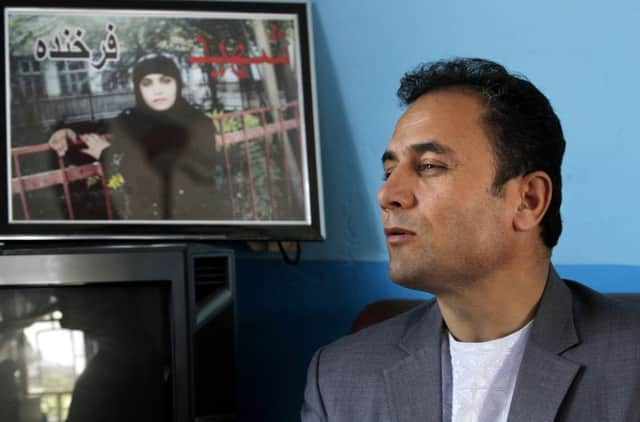Jail for Afghan police who let mob burn woman alive


Judge Safiullah Mojadedi, presiding in Afghanistan’s Primary Court, released another eight policemen for lack of evidence.
The policemen were among 49 people charged over the killing of 27-year-old Farkhunda at a shrine in the Afghan capital, Kabul, on 19 March. Like many Afghans, she used only one name.
Advertisement
Hide AdAdvertisement
Hide AdThe attack sparked protests in Afghanistan which reverberated around the world, highlighting the brutality women face in the religiously conservative Muslim country.
Earlier this month, four other defendants were sentenced to death, eight to 16 years in prison and 18 were freed for lack of evidence in the same case. Members of Farkhunda’s family were not in court to hear the verdicts as they had not been told when the judge would announce them, according to her brother, Mujibullah. He said the family planned to hire a lawyer and appeal the latest sentences.
A mob attacked Farkhunda after an amulet seller accused her of burning a Koran when she challenged him over selling his trinkets to women desperate to have children. Passers-by overheard the argument, and joined in on the side of the amulet seller.
Chilling mobile-phone videos recorded Farkhunda being punched, kicked, beaten with wooden planks, thrown from a roof, run over by a car before finally being set alight and burned to death.
An Afghan presidential investigation later found she had not damaged a copy of the Muslim holy book. However, some public and religious figures said the attack would have been justified if she had in fact burned a Koran.
The trial was broadcast live on national television in Afghanistan, reflecting wide public interest. But the speed with which the first sentences were announced – after just two days of hearings – angered many, including Farkhunda’s family.
The subsequent delay in announcing the verdicts for the police raised concern about the possibility of political interference.
“We have already said we are not happy with the decision of the judge,” said Mujibullah. No date has yet been set for the appeal trial.
Advertisement
Hide AdAdvertisement
Hide AdFarkhunda had argued with the amulet seller about his peddling of charms to women at the Shah-Du-Shamshaira shrine, which is within walking distance of the presidential palace and Kabul’s main bazaar.
The amulet seller is one of those who was sentenced to death earlier this month.